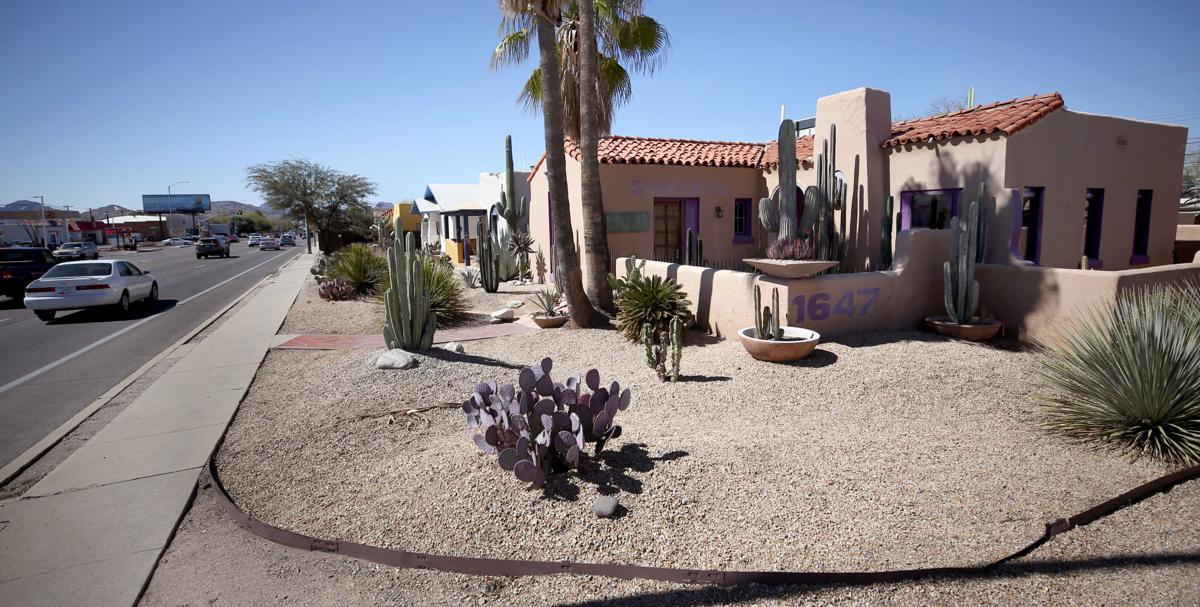An ambitious plan could save dozens of structures along the Sunshine Mile destined to otherwise to be bulldozed as part of the Broadway widening project.
The city of Tucson, the Rio Nuevo Multipurpose Facilities District and the Regional Transportation Authority have signed off on an agreement that would offer incentives to private developers to create walkable, outdoor plazas with places to eat and shop along two sections of Broadway between Euclid Avenue and Country Club Road.
Plans to redevelop along two separate stretches of the Sunshine Mile could cost as much as $20 million, although a majority of that funding would come from private developers.
One such plan would save Solot Plaza, home to Tucson Tamale Co. among other businesses. Rather than demolishing the strip, off of Broadway east of Tucson Boulevard, it would lose its parking lot and transform into a pedestrian shopping plaza.
Another plan calls for a retail center using historic buildings threatened by the widening project, moving up to seven homes off of their current foundations and onto new concrete slabs on the northern edge of the properties.
The proposal comes from Rio Nuevo, which commissioned an independent study on how to best use the largely orphaned buildings and properties affected by the voter-approved Broadway widening project, which is expected to start next year.
Best known for its redevelopment efforts downtown, the taxing district covers an area along Broadway from west of Interstate 10 to Park Place mall.
“We are interested in the remnant properties, those that have to be acquired by the city but not necessarily demolished,” Rio Nuevo Chairman Fletcher McCusker said about the project. “Our interest is in repurposing them, turning them into destinations.”
If the proposals to redevelop two sections of the Broadway where businesses are slated to lose parking or are under the threat of demolition is eventually successful, McCusker said early revenue projections suggest it could generate as much as $4 million annually in sales tax revenue for the city.
In a series of the public workshops, locals told Rio Nuevo consultant Project for Public Spaces that they wanted to see the creation of walkable outdoor areas that offered comfortable amenities that would allow people to linger.
“The goal was to strengthen the Sunshine Mile not only as a retail hub but also to serve as a destination for community groups to gather,” said Meg Walker, a senior vice president at Project for Public Spaces.
Parking was also important, with locals saying they wanted to see the city embrace alternative parking strategies.
“Parking does not have to be allocated for each individual building; it can be combined so that you create fewer large surface lots along Broadway,” she said.
With state funds to renovate the aging buildings, McCusker told the council recently that the taxing district was uniquely suited to transform portions of the Sunshine Mile.
“Rio Nuevo is in a perfect position to do something iconic with this strip,” said McCusker. “We are exempt from the gift clause so we can be very specific about how we find tenants.”
If the city of Tucson had attempted to undertake the project, it would have to consider a wider range of proposals — including those that aren’t suited for a walkable retail or arts district.
Under the terms of the deal, the city of Tucson would hand over the properties it has already purchased with RTA funds related to the Broadway widening project to Rio Nuevo.
Rio Nuevo would work with private parties to redevelop the properties and either lease or eventually sell them.
The city of Tucson would receive additional sales taxes if the project moves ahead, but it also saves on the holding costs of the remnant properties — everything from securing the buildings to the eventual cost of selling what would be considered “as-is” surplus property.
Rio Nuevo would also work with privately owned properties along the Sunshine Mile that are inside the boundaries of the planned district.
A third-party analysis authored nearly two years ago put a hefty price on saving the historic structures between Cherry and Warren Avenues on the north side of Broadway.
Construction Cost Consulting estimated it would cost roughly $1.13 million to save seven structures, but $160,000 to demolish the same structures and backfill the lots.
The cost per building varies.
For example, the historic bungalow that houses the Stone Cactus Gallery, located at 1647 E. Broadway, was estimated to cost to $141,300 to save for redevelopment.
It would take about $22,380 to destroy the same building.
City officials are optimistic about the proposal.
Vice Mayor Paul Cunningham called the proposal “brilliant” but cautioned that the city could not underwrite any future unforeseen costs related to the redevelopment of the properties.
Councilman Steve Kozachik, whose ward includes the Sunshine Mile, was cautiously optimistic about the project.
“A contagious excitement is going to replace right now what is a dead-in-the-water attitude because nobody knows what was coming,” he said.





